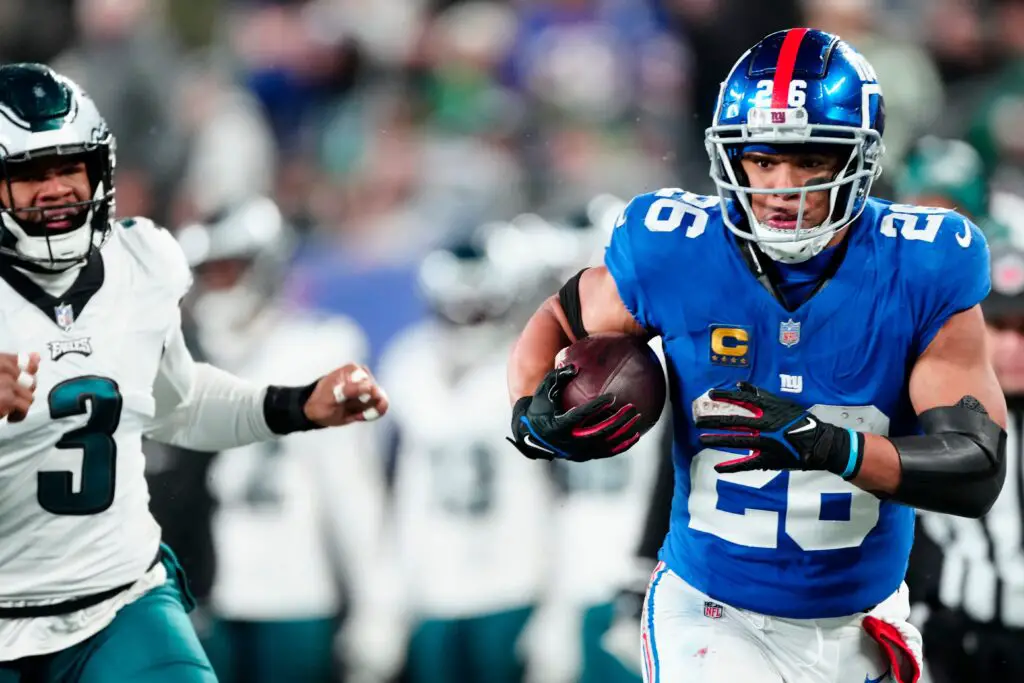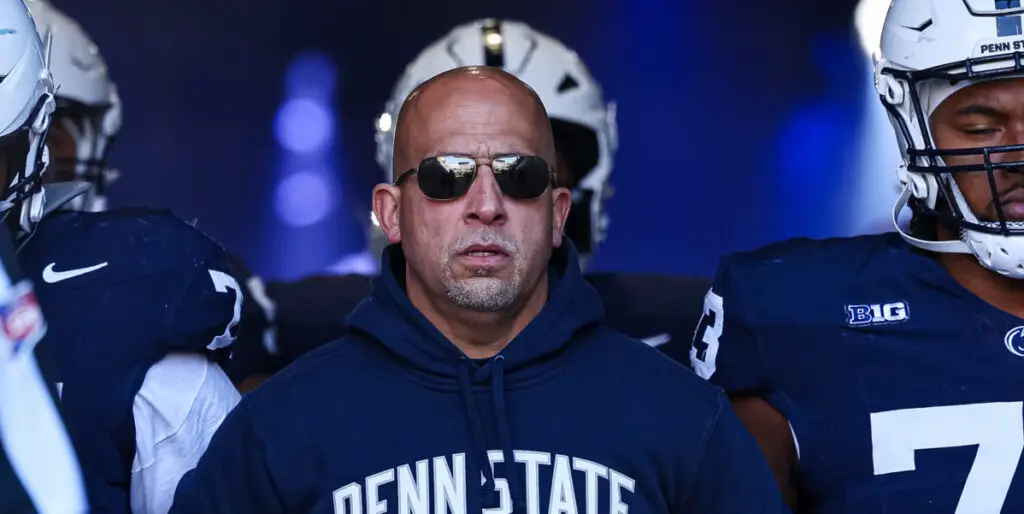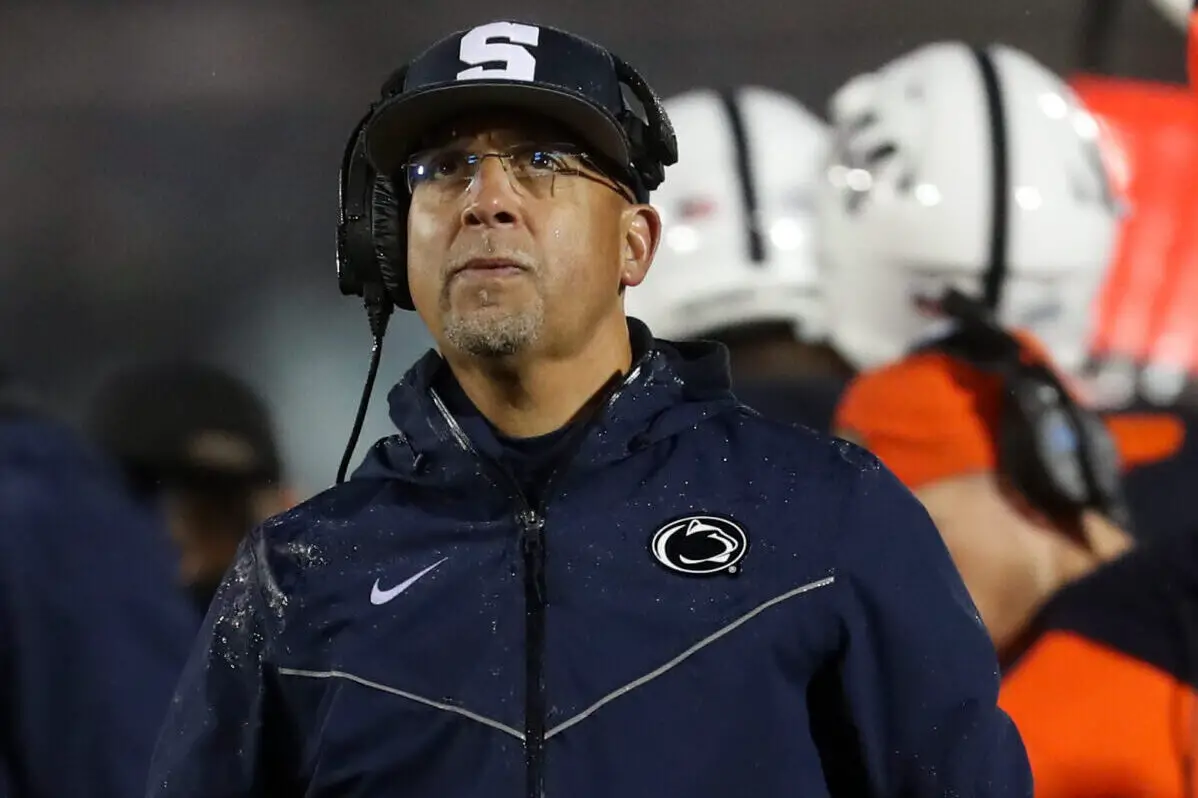Philadelphia Eagles General Manager Howie Roseman made a splash this past week by luring and signing former Penn State phenom Saquon Barkey to a three year megabucks deal.
Of course what would be an Eagles’ off-season without a snafu or two?
Barkey’s former coach and mentor James Franklin unintentionally may have cost Barkley’s new team some cash and or draft capital.
How’s that possible you ask?
Well, keep reading. More on that in a moment.
Let’s first explore the recent history of behavioral issues of a league that can’t get out of its own way, yet is far and away the most successful league in human history.

NFL No Stranger to Scandals … Real or Created
For a money printing conglomerate bulldozer like the NFL that collectively grosses around $19 billion per year, they certainly come up with more baseless reasons to complicate their existence by implementing stipulations and/or amendments to certain basic rules and guidelines that had previously been in place, and working just fine thank you, since the league’s inception in 1920.
There was of course the Tuck Rule, implemented in 1999 for reasons that are still murky at best. That brilliant piece of purposeless legislation lasted until 2013, only 11 years after it rose to public infamy in the now famous “Tuck Rule Game”, a Divisional round playoff game between the Patriots and the Raiders back in 2002. Don’t get me started.
Then of course there was the witch hunt, ironically again, involving a man named Brady, that wasn’t all that well disguised by the NFL, that came to be known as Deflategate.
At halftime of the AFC Title game in 2015, the Indianapolis Colts, for reasons that are still unclear, decided it was a good and worthy idea to accuse Tom Brady of playing with underinflated footballs. After a half-assed, impromptu, non-controlled testing of the balls by league officials, it was found that there was some merit to the Colts’ claims and ordered the footballs to be reinflated to their official game weight during half time, which is 12.5-13.5 p.s.i.
Turns out the problem was more or less the Colts’ defense, rather than the underinflated balls, as Brady and the Pats outscored Indy 28-0 in the 2nd half of that game en route to a 45-7 victory and eventually, their fourth Super Bowl Title. Two seasons, a highly publicized embarrassing legal battle, a four game suspension and 234 pages of bureaucratic investigatory power posturing and preening later, the Patriots won their fifth Super Bowl Championship. Didn’t I say don’t get me started?
Then of course, the granddaddy of them all – the Catch Rule.
A catch used to be a catch when a receiver possessed the ball and had two feet in bounds. Pretty straight forward right? But when Tampa Bay’s Bert Emanuel made a catch that was shockingly overturned in the NFC Title game back in 2000 versus the St. Louis Rams, because it was deemed that the ground assisted him in possessing the ball, all Hell broke loose.
That one play gave way to never-before-heard and completely over-thinking-it terms like “the process of the catch” which gave way to “making a football move” which gave way to “a move common to the game” which gave way to “becoming a runner with the ball” which gave way to my personal favorite “possessing the ball through the ground.” With every attempt to eliminate the confusion, the addendums to the Catch Rule have made it that much more convoluted and infuriating for fans, players and teams alike.
You really got to hand it to those rules committee folks. They took a simple rule and have made it so ridiculously nonsensical and illogical, there are contradictory loop holes in it that even the committee hasn’t thought of.
But perhaps the most curious from the NFL’s brilliant think tank philosophy of “if it ain’t broke, break it” comes in what is known as “legal tampering”.
It’s a contradictory term of sorts that the NFL introduced back in 2013 that allows teams to talk to free agents, through their agents, for a 52 hour period prior to the official start of free agency.
<< BUY PENN STATE GEAR >>

NFL Legal Tampering … Legally Flawed
It is widely believed that the NFL did this because they were aware that so much of it was already going on, why not “legalize” it so they wouldn’t have to monitor it or enforce it that closely.
So, basically, the only thing the implementation of the term “legal tampering” did was underscore the fact that illegal tampering was and still is rampant in the NFL. Makes sense right? Before you answer, just remember that we’re talking about the league of extraordinary antitheses.
To be clear, just know that tampering is not a law that exists in the U.S. and is only a rule that the pro leagues (NFL, NBA, NHL) invented to protect wealthy owner’s money from other wealthy owner’s money. In fact labor laws in the U.S. allow what the NFL doesn’t, and any rule in the corporate world, written or otherwise that prohibits “tampering” is a violation of antitrust laws.
But in the NFL, teams cannot talk to players on other teams outside of certain periods in order to prevent the destabilizing of another team mid-season to protect internal contracts and league revenue. The reason the pro leagues can do this is because they have monopoly exemptions from Congress as long as they comply with the exemption rules.
The textbook definition of “tampering” defines it as: The act or process of changing, damaging, or interfering with something, especially with intent to falsify, cheat, or defraud; The act or process of dealing secretively, improperly, or underhandedly with someone.
None of this describes what went on when the authorized, scheduled negotiation period started last Monday. There is nothing whatsoever illegal about this part of free agency, nor is there anything tampering about it. Except that the NFL, in all their wisdom, decided to implement addendums to their definition of “legal tampering” and it’s those addendums that have gotten some teams in hot water.
What the NFL doesn’t allow during the “legal tampering” period is team officials to talk to free agents other than their own and that’s what has gotten the Philadelphia Eagles in a little bit of trouble this past week. The only exception to this is if the player does not have an agent. If that’s the case the player can talk directly to team officials.
So back to James Franklin. At his press conference last Tuesday, Penn State’s head man may have outed Roseman by disclosing some details of Roseman’s pitch to Franklin’s former prize running back Saquon Barkley, who agreed to a three year deal worth close to $16 million per year all included. The league apparently is investigating the matter along with a few others that have come to light regarding the free-for-all period prior to last Wednesday’s 4pm official start of free agency.
At his introductory press conference in Philly last Thursday, Barkley attempted to shut down the alleged tampering violations citing that Franklin misunderstood what he had told him.
“Coach Franklin, I think he misinterpreted it,” Barkley said with a smile at the NovaCare Complex Thursday. “The truth was to sell basically Penn State. So many Penn State fans are Philadelphia Eagles fans, but that was through my agent. My agent told me that.”
Sure Saquon, we’ll go with that for now. Wink wink.
The problem with the NFL, if you couldn’t tell, is the lack of foresight AND hindsight. Did they really think that players are going to agree to multi-million dollar deals without talking to any members of the brass from their respective suitors?
Conversely, did they really think that teams are going to shell out millions of dollars to players they haven’t spoken to personally? It’s not even a good idea in theory let alone from a practical standpoint.

These players are about to be free to sign with any team they choose. So what’s the problem?
Technically, when the official free agent period begins, free agents aren’t bound by any team so their current team has had every opportunity to resign their own, so if they get poached they have no one to blame but themselves. In fact, teams are allowed to negotiate with their own players even before the “legal tampering” period begins. So again, they have basically been given the right of first refusal with their own free agents-to-be and if they can’t get a deal done that works for both sides before the official free agent period begins then I ask again, what’s the problem?
The problem is that there’s really no rhyme or reason to the “legal tampering” period except that if the NFL didn’t apply certain restrictions then it wouldn’t differentiate itself from the official start of free agency.
The NFL has allowed and in fact encouraged, a wild, wild west environment where getting there first means everything, but then punishes teams for violating the pointless parameters with hefty fines and or loss of draft picks. It’s extremely difficult to get caught and since the upside is so high it behooves teams to break the rules and assume the risk.
Former Viking quarterback Kirk Cousins just signed a 4-year, $180 million dollar contract with the Atlanta Falcons but at his introductory press conference last Wednesday, he basically indicted himself and the Falcons by thoughtlessly explaining how comfortable he felt with the training staff and PR people when he spoke to them prior to the official start of free agency last Wednesday at 4pm. Oops!
Keep in mind neither the Vikings nor the Giants have complained or filed a grievance with the league. It’s almost a “don’t ask, don’t tell” good old boys network of Omertà when it comes to the “legal tampering” period.
There’s a difference when a team contacts one of your coordinators during Super Bowl week and wants to gauge his interest in coaching their team the following year.
That’s what the Eagles claimed the Arizona Cardinals did last year in the days leading up to Super Bowl 57 when they contacted then Eagles’ defensive coordinator Jonathon Gannon. Gannon became the Cardinals’ head coach just hours after the game. The Birds were awarded draft picks as compensation for the illegal tampering by the Cardinals. That’s a much different animal.
As much as the country is obsessed with the NFL and the product it puts out on a weekly basis in the Fall, it is somewhat amusing and almost satisfying to watch their arrogance, hubris and propensity to over complicate matters come back to bite them in the form of unparalleled confusion, public criticism and media scrutiny. Although $19 billion per annum can certainly alleviate the sting of the more than occasional P.R. hit. So there’s that.
MORE: Why Saquon Barkley in Philly Puts the NFL on Notice

A note to our readers; If you make a purchase through one of our affiliate links, we may receive a commission
- A Postion-Wide Culture Change Emerging for Penn State Football - July 12, 2024
- Julian Fleming: 3 Fast Facts, 2 Bold Predictions for 2024 Season - May 23, 2024
- Nick Singleton: 3 Fast Facts, 2 Bold Predictions for 2024 Season - May 21, 2024


